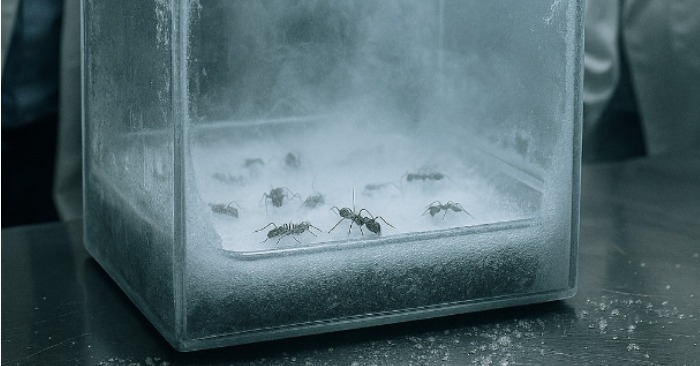It sounds cruel at first — freezing ants. But the experiment wasn’t about harming them. It was about answering one of nature’s strangest questions: just how resilient are these tiny creatures we often step over without a second thought?
The study began in a university lab where researchers were exploring survival in extreme conditions. Ants, with their complex societies and incredible adaptability, seemed like the perfect candidates. After all, ants have been known to survive floods, desert heat, and even chemical warfare between rival colonies. But could they survive freezing?
Into the Cold
The scientists carefully placed groups of live ants into controlled chambers, gradually lowering the temperature until the insects slowed down and eventually stopped moving altogether. At first glance, the results seemed final. The ants looked lifeless, their tiny legs curled, their bodies stiff. Some of the younger assistants in the lab whispered that they had just witnessed mass death.
But the lead researcher shook his head. “Wait,” he said quietly. “This isn’t the end.”
The Moment of Thaw
Hours later, the temperature inside the chambers was raised back to normal room conditions. And what happened next left everyone staring in disbelief.
Slowly, one by one, the ants began to stir. At first it was just the twitch of an antenna. Then a leg shifted. And within minutes, the once-frozen insects were back on their feet, walking as if nothing had happened.
The students gasped. It was like watching tiny creatures come back from the dead. Some ants immediately began cleaning themselves, brushing ice crystals from their bodies. Others reunited with their nestmates, resuming the same social patterns they had before the freeze, as if time itself had only paused.
How Is This Possible?
The explanation lies in biology. Certain species of ants can produce natural antifreeze proteins inside their bodies, preventing ice crystals from causing permanent damage to their cells. This adaptation helps them survive in colder climates, but in the lab, it played out like a resurrection miracle.
Not all ants survived the extreme cold. Some species were more vulnerable than others. But those that did endure proved just how extraordinary insect evolution can be.
Why It Matters
This wasn’t just a strange sideshow for curious scientists. The experiment revealed important clues about how life can survive under extreme conditions. Understanding these processes could help scientists in fields ranging from medicine — protecting organs for transplants — to space exploration, where astronauts might one day face harsh, freezing environments on distant planets.
But perhaps the most humbling part of the experiment was the reminder it gave to the people who watched it. These tiny creatures, so often ignored or swatted away, demonstrated a kind of resilience that humans can only dream of.
The ants walked again, proving that even in the face of ice and silence, life has a way of coming back.







